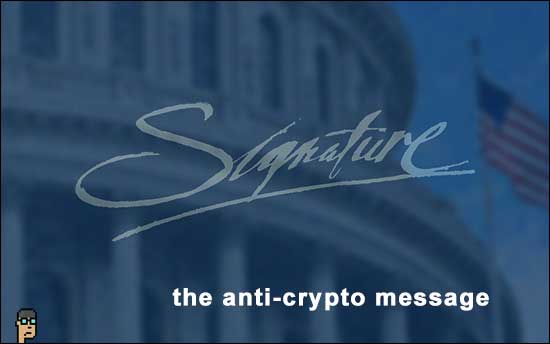Here’s today’s blockchain tipsheet… prefer it by email? Sign up here.
sending a message
Former Democratic Congressman Barney Frank (D, MA) has been caught up in the latest crypto drama with his role on the board of now-failed Signature Bank which was shutdown by the New York Department of Financial Services (NYDFS) on Sunday.
Frank, who co-authored the Dodd-Frank Act coming out of the Great Financial Crisis in 2008, saw more sinister implications than just a “bank run.” He told CNBC, “I think part of what happened was that regulators wanted to send a very strong anti-crypto message… We became the poster boy because there was no insolvency based on the fundamentals.” Read more. Sounds like more Choke Point 2.0?
NYDFS Superintendent Adrienne Harris said in a press conference yesterday, “Signature Bank had a broad depositor base. The idea it is a crypto bank is not an accurate one. They banked small business all over New York…” See the video (at 10:15).
your money is no good here
Senator Elizabeth Warren (D, MA) signaled her strong dissatisfaction with the bank deposit coverage plan announced Sunday by bank regulators. In a New York Times editorial, she writes, “…it’s no wonder the American people are skeptical of a system that holds millions of struggling student loan borrowers in limbo but steps in overnight to ensure that billion-dollar crypto firms won’t lose a dime in deposits.” This is likely in reference to the Circle (issuers of the USDC stablecoin) deposits held by Silicon Valley Bank, which was shutdown due to a run on the bank. Read more.
self-regulatory organization
Rep. Byron Donalds (R, FL), a member of the House Financial Services’ Digital Assets, Financial Technology and Inclusion Subcommittee, said he’s ready to support a regulatory framework for the cryptocurrency industry that enables an SRO – “let the industry become a self-regulating industry (…) That’s just where I stand,’ he told Politico. Read more.
CBDC as private cash
In an opinion piece on The Hill, former Commodity Futures Trading Commission (CFTC) Chair Chris Giancarlo and American Enterprise Institute’s Jim Harper say the time may be soon for a privacy-enhanced Central Bank Digital Currency (CBDC) in the United States. They call it a “freedom coin.”
While acknowledging concerns about surveillance for some country’s applications of a CBDC strategy (such as China), Giancarlo and Harper see a route inclusive of “personal financial privacy” that is too great to ignore: “The advent of CBDCs offers the opportunity to reassess contemporary financial surveillance activities in their entirety and possibly rebalance them in accordance with American constitutional norms, the presumption of innocence and the rule of law.” Read it.
Giancarlo is also on the Board of the Digital Dollar Project.
Tip: Giancarlo is a Republican and his view contrasts with current Majority Whip Rep. Tom Emmer (R, MN) who recently introduced the “CBDC
Anti-Surveillance State Act,” who is not a CBDC believer at present.
algorithmic charges
Terraform Labs and its TerraUSD (aka UST) algorithmic stablecoin, whose value imploded last May, is under the microscope again. This time it’s courtesy of the United States Justice Department. There’s already a civil suit against Terraform from the Securities and Exchange Commission announced last month. The Wall Street Journal reports that investigators are said to be asking about a possible connection to “Chai, a South Korean payment app, and the underlying blockchain that Terraform created to power UST.” Read more.
new CFTC committee
Commodity Futures Trading Commission (CFTC) Commissioner Christy Goldsmith Romero announced the membership of her new Technology Advisory Committee (TAC) yesterday. It includes as its Chair the former Director for Cybersecurity and Secure Digital Innovation for the White House’s National Security Council, Carole House. Ari Redbord, a policy executive at TRM Labs, will be the Vice Chair. See all the members. House spoke at last year’s crypto conference Consensus.
NFT news
Meta is changing direction after rolling out its non-fungible token (NFT) initiative in November. Stephane Kasriel, who leads Commerce and FinTech at the company, tweeted: “We’re winding down digital collectibles (NFTs) for now to focus on other ways to support creators, people, and businesses.” Read more from the Block.
But fear not, JPEG lovers, Sesame Street is launching NFTs including one with Cookie Monster according to Variety. Read that one.
Toomey speaks
“The Silicon Valley Bank collapse and the broader banking problems are a direct consequence of the Federal Reserve’s disastrous monetary policies.” So starts a Twitter thread about recent developments by former Senator Patrick Toomey (R, PA) yesterday. Read the thread.
more tips
-
- 2024 Congressional Budget Justification and Annual Performance Plan; 2022 Annual Performance Report (PDF) – SEC.gov
- HSBC rescues British arm of stricken Silicon Valley Bank – Reuters
- Crypto’s 24/7 Trading Disrupted By Bank Crisis (subscription) – The Information
- Opinion: SVB Collapse Shows Fickleness of Crypto Money – The Washington Post
- Crypto Scours the Globe for Banks to Replace Collapsed US Lenders – Bloomberg
- In Yet Another Crypto Attack, Hackers Pillage $197 Million From Euler Finance – Gizmodo
If you would like this delivered as a newsletter, please sign up here.

